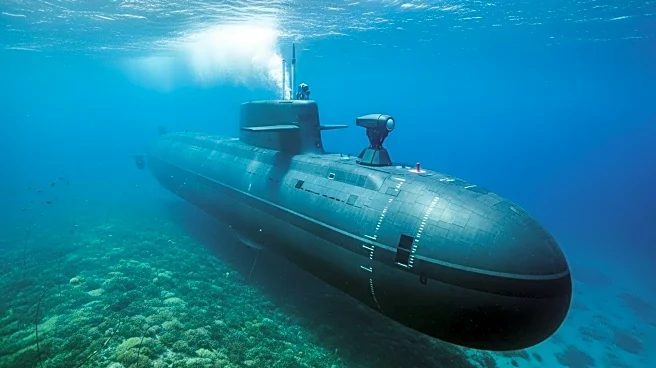What is the story about?
What's Happening?
Taiwan has increased its patrols on subsea cables to prevent potential damage, with radio warnings issued to boats before coast guards are dispatched. This move comes as Taiwan faces threats to its undersea cables, which are crucial for the island's communications. The Taiwanese coast guard is conducting 24-hour patrols in the Taiwan Strait, focusing on the TP3 cable, which was previously severed by a Chinese vessel. Taiwan's National Security Council has highlighted the vulnerability of submarine cables in densely populated areas near China. The patrols are part of Taiwan's efforts to combat China's grey-zone warfare tactics, which aim to drain Taiwan's resources without engaging in direct conflict. Taiwan is also monitoring nearly 400 China-linked boats, including cargo ships that could be converted into war vehicles.
Why It's Important?
The increased patrols underscore the strategic importance of undersea cables for Taiwan's communication infrastructure and national security. These cables are vital for internet connectivity and data transmission, making them critical assets for the island's economy and daily operations. The threat from China-linked vessels poses significant risks to Taiwan's stability and security, as disruptions to these cables could lead to communication outages and economic losses. By intensifying patrols, Taiwan aims to safeguard its infrastructure and deter potential sabotage, which could have broader implications for regional security and international relations. The situation highlights the ongoing tensions between Taiwan and China, with Taiwan seeking to protect its sovereignty and maintain peace in the region.
What's Next?
Taiwan is expected to continue its vigilance and enhance its security measures around subsea cables. The sharing of intelligence with other like-minded nations indicates a collaborative approach to addressing the threat posed by China-linked vessels. This cooperation could lead to more coordinated efforts in monitoring and responding to potential incursions. Additionally, Taiwan may seek to strengthen its diplomatic ties with other countries to garner support against China's aggressive tactics. The situation may also prompt discussions on international regulations and protections for undersea cables, given their critical role in global communications.
Beyond the Headlines
The patrols reflect broader geopolitical dynamics, with Taiwan asserting its independence and resisting China's territorial claims. The focus on subsea cables highlights the evolving nature of warfare, where infrastructure becomes a target in grey-zone conflicts. This development raises ethical and legal questions about the protection of critical infrastructure and the responsibilities of nations in safeguarding global communication networks. The situation could lead to long-term shifts in security policies and international cooperation to address similar threats worldwide.
















